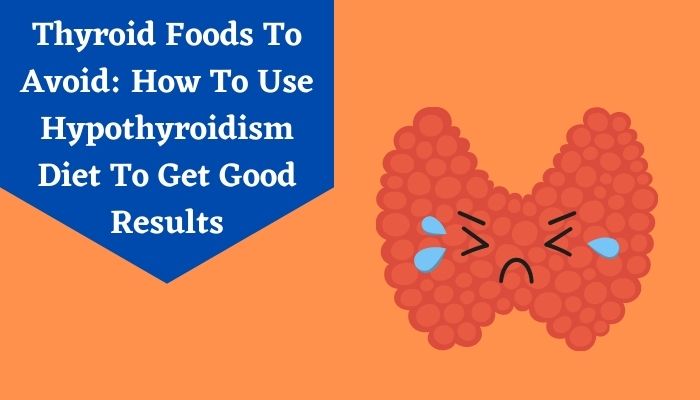Mrs. Kelkar (45-years-old) lives in Nashik and works in a private organization. Over the past few days, she was feeling cold and a little bit lethargic. Initially, she thought it was due to a seasonal/normal cold but after doing some tests; she came to know that she is having hypothyroidism. While consulting, the doctor advised her about some medications and also told her some thyroid foods to avoid managing her hypothyroidism symptoms.
The thyroid hormone regulates the speed of your metabolism. You will burn more calories if your metabolism is faster. People who are having hypothyroidism produce less thyroid hormone. This means their metabolism rate is slower and they burn fewer calories as compared to others. A slow metabolism makes you more susceptible to various diseases like higher cholesterol levels, fatigue and you will find it difficult to lose weight.
Though medications and exercises are recommended to control your hypothyroidism symptoms, your diet also plays a pivotal role in the symptoms of hypothyroidism. Certain food items will improve your symptoms, while others will aggravate your condition or interfere with treatment.
Let’s take a look at some foods to avoid with hypothyroidism.
Also Read: 11 Yoga Asanas that Reduce Symptoms of Hypothyroidism
List of Foods to Avoid for Thyroid Patients
1. Soy Foods Including Tofu and Miso
Several experts believe that certain compounds (called isoflavones) in soy will produce a negative impact on thyroid patients. They also believe that excessive consumption of soy may enhance a person's risk for hypothyroidism. A study was published in March 2019 in Scientific Reports and according to it; soy doesn’t influence thyroid hormone and very marginally enhances the level of TSH (Thyroid Stimulating Hormone).But some studies still indicate that consumption of soy may inhibit your ability to absorb thyroid medication. For this reason, the doctors suggest that you should wait four hours after eating soy-based foods before taking your thyroid medications.
2. Cruciferous Vegetables like Broccoli and Cauliflower
Though vegetables like broccoli and cabbage are full of fiber and other essential nutrients, they may inhibit the production of TSH if you have an iodine deficiency. If you take these vegetables, you need to restrict your intake of Brussels sprouts, cabbage, cauliflower, kale, turnips, and bok choy. Several medical studies have also claimed that eating these vegetables may inhibit the thyroid's ability to utilize iodine.If you are having both hypothyroidism and iodine deficiency, by adopting certain ways, you can make these vegetables less injurious. You must cook them completely to minimize the effect of those cruciferous vegetables on your thyroid gland. Don’t consume these vegetables for more than 5 ounces a day. Because this amount usually has no adversative effect on thyroid function.
3. Fatty Foods like Butter, Meat, etc
Medical studies have shown that fats will disturb your body’s ability to absorb thyroid hormone replacement medicines. Fats can also inhibit the thyroid's ability to release the hormone. That’s why healthcare professionals recommend that you should discard all fatty foods and minimize your intake of fats from food items like butter, mayonnaise, margarine, and meat.4. Gluten
People with Hashimoto’s disease (a prime cause of hypothyroidism) are more susceptible to have celiac disease as compared to others. Both Hashimoto’s and celiac diseases are autoimmune disorders, and a person with one of these disorders is more prone to develop another. Several medical studies have revealed that removing gluten from your diet will improve thyroid function in people who have Hashimoto’s but don’t have celiac disease.Due to the indigestion of gluten, celiac disease causes inflammation and damage to the small intestine. Gluten is a protein that is commonly found in wheat and other grains, including barley, oats, and rye.
People who have autoimmune-related hypothyroidism should opt for a gluten-free diet to observe whether their symptoms are improving or not.
5. Sugary Drinks
Hypothyroidism slows down your body’s metabolism. This means you can’t lose weight easily. You should discard food items that are loaded with sugar and no nutrients. Thus, people with hypothyroidism should discard sugary food items completely from their diet.6. Processed Foods
If you have hypothyroidism, you should minimize the intake of ultra-processed and added sugar food items. This will not only improve your symptoms but also will manage your weight, and boost overall well-being.Some ultra-processed food items that come up with lots of sugar are:
- Fast food
- Hot dogs
- Donuts
- Cakes
- Cookies
- Soda
7. Coffee
Many studies have shown that caffeine blocks the absorption of thyroid hormone replacement. People who are taking their thyroid medicines along with morning coffee may have uncontrollable thyroid levels. Doctors also suggest that you should consume medications only with water and wait for 30 minutes before plunging into a cup of coffee.8. Alcohol
Alcohol can disrupt your thyroid hormone levels in the body and also inhibits the ability of the thyroid gland to produce the hormone. Alcohol makes a lethal effect on the thyroid gland and overpowers your body’s ability to use thyroid hormone. People who have hypothyroidism should avoid alcohol consumption or drink it moderately.These are some foods to avoid for thyroid patients.
Other Dietary Tips
- Always take your thyroid medication on an empty stomach so that your body can absorb it utterly. Take your medications at least 30 minutes before your breakfast.
- Don’t take foods within four hours that contain iron or calcium
- Antacids or acid reducers
- Calcium supplements
- Iron supplements
- High-fiber foods, such as bran flakes, fiber bars, and fiber drinks
- Iodine-rich foods
- Soy-based foods



